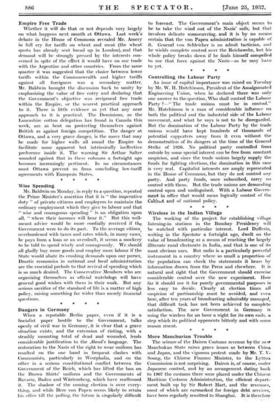Whether it Will do that • or not depends . very
largely on what happens next Month at Ottawa. Last week's debate in the House of Commons revealed Mr. Amery in full cry for tariffs on wheat and meat (the wheat' quota has already sent bread up in London), and that demand will be strongly pressed by the interests con- cerned in spite of the effect it would have on our trade vvith the Argentine and other countries. From the same quarter it was suggested that the choice between lower tariffs within the Commonwealth and higher tariffs against all foreigners was a secondary matter. Mr. Baldwin brought the discussion back to sanity by emphasizing the value of free entry and declaring that the Government's objective was reciprocal free trade within the Empire, or the nearest practical approach to it. There is little evidence as yet' that any near approach to it is practical. The Dominions, as the Lancashire cotton delegation has found in Canada this -week, are as bent on protecting themselves against British as against foreign competition. The danger at Ottawa, and a very grave danger, is the move that may be made for higher walls all round the Empire to facilitate some apparent but intrinsically ineffective preference inside it. The warning Sir Arthur Salter sounded against that in these columns a fortnight ago becomes increasingly pertinent. In no circumstances must Ottawa prevent us. from concluding low-tariff agreements with European States.
* * * *


































 Previous page
Previous page